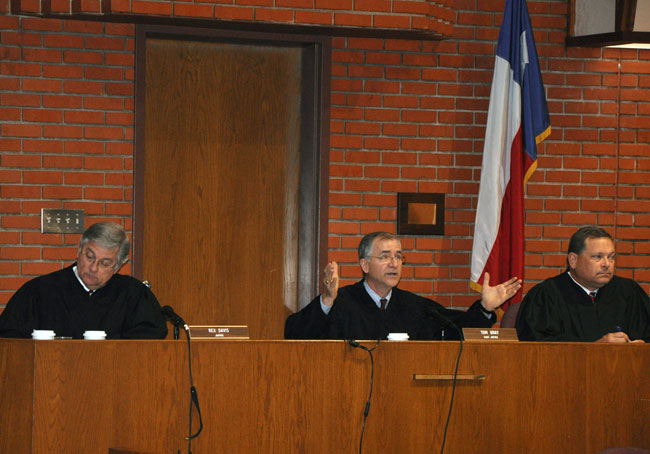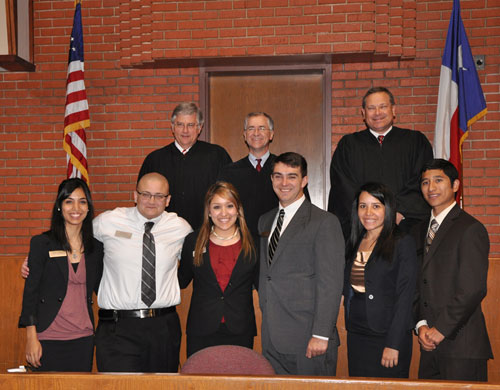Appeals Court Makes Debut At SHSU
May 7, 2012
SHSU Media Contact: Beth Kuhles
 |
| The 10th Court of Appeals heard live appeals in four criminal cases in the Hazel B. Kerper Courtroom in the Criminal Justice Center. The court includes (from left) Judges Rex Davis, Tom Gray and Al Scoggins. |
For the first time in its history, the Texas 10th Court of Appeals came to Sam Houston State University to hear oral arguments in real criminal case appeals in the Hazel B. Kerper Courtroom at the Criminal Justice Center.
The court session, sponsored by SHSU Junior Fellows and hosted by the College of Criminal Justice, was part of an effort to educate the public about the operations of the mid-level courts in Texas. Throughout the day, 355 students, faculty, county officials and members of the public packed the courtroom to listen to four criminal appeals, including a murder case, two drug cases and a drunken driving case.
“This is all about education,” said Chief Justice Tom Gray. “That’s why we travel. We want you to see how an intermediate court of appeals functions. That’s what this is all about.”
The 10th Court of Appeals—which includes Gray and Justices Rex Davis and Al Scoggins—covers 18 counties in Central Texas and hears approximately 400 civil and criminal appeals annually from lower courts in Bosque, Brazos, Burleson, Coryell, Ellis, Falls, Freestone, Hamilton, Hill, Johnson, Leon, Limestone, Madison, McLennan, Navarro, Robertson, Somervell and Walker counties. The Court’s permanent seat is in Waco, but it was granted the authority by the Texas Legislature to sit in any county within its jurisdiction.
“This was just too good of an opportunity to pass up,” Junior Fellow Santiago Casas said. “We have hundreds of students at SHSU who want to be lawyers, and, of course, many who are interested in the legal process. With just a few modifications to the process and a little travel, the court provided a fantastic educational opportunity to the community.”
To enhance public understanding of the process, justices allowed defense attorneys and prosecutors to provide a three-minute summary of each case and the appeal issues to be discussed. In a regular appeal, each side is given 20 minutes to address their issues and answer questions from the court, with a five-minute rebuttal for the defense. Decisions on the cases will be issued by the court in the future.
The case of Brandon Cornelius Harris, who was convicted of murder, was appealed based on the claim that the trial court committed reversible error when it failed to charge the jury on the lesser-included offenses of aggravated assault and manslaughter. Harris was convicted of stabbing Ojibe Lewis once at his apartment complex in Bryan, causing his death. Lewis and Harris began having problems three week earlier over a stolen car stereo, and Harris pursued and stabbed Lewis after he fell in the complex.
 |
| Members of Junior Fellows pose with the 10th Court of Appeals justices (back row, from left) Scoggins, Gray and Davis. |
Harris’ attorney said the defendant testified he did not intend to kill Lewis and that it should have been up to the jury to determine if Harris had intent to cause serious bodily injury. The trial court denied Harris’ request for lesser-included offenses in its charge to the jury.
The 10th Court of Appeals also heard two drug cases. In Robert Romero’s case, the College Station Police Department executed a search warrant at the defendant’s house and recovered 31 ounces of cocaine, 14 ounces of marijuana, 21 firearms, and more than $27,000 in cash.
In his appeal, Romero said that the warrant used was invalid because it was based on “stale” information, a three-month old statement by a confidential informant. Romero said the judge further erred in allowing a police officer to testify that the date in the warrant was a clerical error. In addition, Romero challenged two, $25,000 fines for each drug count, saying those fines are not permitted by the laws covering habitual offenders, which were used to sentence him to 62 years in jail.
In a second drug case, William Johnson was convicted of second-degree delivery of a controlled substance after an informant purchased rock cocaine from him. During the penalty phase, he was sentenced to 40 years in prison because of enhancement allowed for prior felony conviction. The appeal is based on a due process claim. Johnson said the trial judge failed to grant a continuance in the case after Johnson received information on the informant’s criminal background just four days before the trial began. Johnson also said the court failed to properly authenticate the video of the undercover drug buy.
Finally, Larry Gordon Randall appealed his guilty plea on a driving while intoxicated charge in College Station because he said the court failed to suppress evidence in the case. Randall was pulled over to the shoulder of the road when he was approached by a police officer, who turned on his red and blue emergency lights. When the officer detected signs of possible intoxication, he conducted a DWI investigation.
Randall said that the use of red and blue emergency lights converted the encounter into a detention, and any reasonable person would not feel that they were free to leave. The officer said he did not intend initially to detain Randall, but used the light for his and Randall’s safety.
The Junior Fellows were key in getting the 10th Court of Appeals to Sam Houston State University. In addition to handling the logistics and arranging for security by local law enforcement officers, the student organization arranged to have several law-related classes attend the proceedings. The session was also attended by the court’s staff and the Walker County District Clerk’s Office as well as public officials from Walker and Brazos counties.
“This was a wonderful opportunity for the residents of Walker County and the students at SHSU,” said Mike Yawn, clinical professor of political science at SHSU. “We are grateful for the justices’ willingness to come to Huntsville, to the staff at the CJ Center for their wonderful work, and to the law enforcement agencies that provided security. It was a great learning opportunity, and I think the community made the most of it.”
- END -
This page maintained by SHSU's Communications Office
Associate Director: Julia May
Manager: Jennifer Gauntt
Located in the 115 Administration Building
Telephone: 936.294.1836; Fax: 936.294.1834
Please send comments, corrections, news tips to Today@Sam.edu.

 SamWeb
SamWeb My Sam
My Sam E-mail
E-mail

